Irish Setters, with their striking red coats and exuberant personalities, have earned a reputation as one of the most cherished sporting breeds in the dog world. Their boundless energy and innate friendliness make them a delight in social settings, often capturing the hearts of dog enthusiasts and pet owners alike. Are Irish Setters good with other dogs? Yes, their innate friendliness and social nature often make them excellent companions for other dogs.
However, owning an Irish Setter entails more than admiration for their physical beauty and charm. Ensuring these lovely dogs get along well with other dogs requires understanding their unique behavioral tendencies and how they interact with fellow canines. For those aspiring to create a harmonious multi-dog household, learning about the social dynamics of Irish Setters is essential.
Table of Contents
Breed Overview
The Irish Setter is a popular dog breed known for its stunning red coat, athletic build, and friendly demeanor. Originally bred for hunting, this breed has become a beloved companion for many families and hunters alike. With their high energy level and strong prey drive, Irish Setters require regular exercise and mental stimulation to prevent boredom and destructive behavior. As a member of the Sporting Group, Irish Setters are recognized by the American Kennel Club (AKC) and are prized for their intelligence, loyalty, and affectionate nature.
The Temperament of Irish Setters
Irish Setters are celebrated for their joyful and outgoing disposition. They thrive on interaction and rarely exhibit signs of aloofness or reserve. Their playful and often exuberant nature means they are outgoing dogs are eager to form connections, whether with humans or other dogs. Despite their affable personality, their high energy levels can occasionally come across as overwhelming, particularly to smaller or more timid dogs.
Owning an Irish Setter puppy can be a delightful yet challenging experience due to their energetic and sometimes hyperactive nature. Controlled introductions and gradual acclimation to new companions can help ease potential tension and create a balanced dynamic. Irish Setters bring warmth and vitality to their interactions, but thoughtful guidance is key to ensuring that their natural enthusiasm is well-received by other breeds.
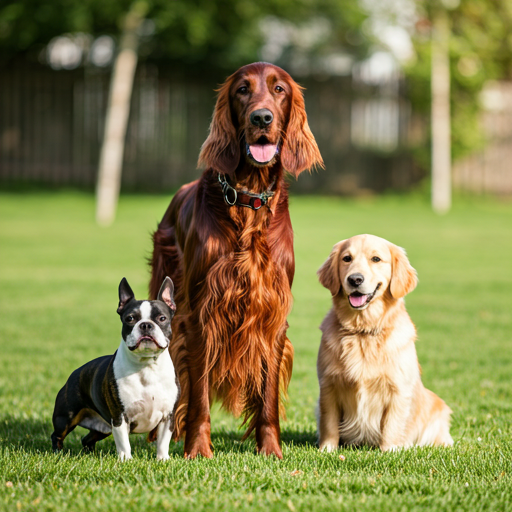
The bedrock of a well-adjusted Irish Setter is consistent and comprehensive socialization from a young age. Introducing Irish Setter puppies to various dogs, environments, and experiences during their critical developmental periods helps them grow into confident and adaptable adults.
Structured settings such as puppy classes provide safe opportunities for young Irish Setters to engage with other dogs, while visits to the dog park and supervised playdates further enrich their social repertoire. Beyond mere exposure, pet owners must also emphasize teaching boundaries. A well-socialized Setter understands not only how to engage but also when to step back, ensuring smooth interactions with loyal dog across various scenarios.
Interacting with Other Breeds
Irish Setters tend to display a natural affinity for companionship, often making them compatible with a wide range of dog breeds. With smaller breeds, their size and exuberance necessitate careful supervision to prevent unintentional intimidation or rough play.
Historically, Gordon Setters played a significant role in the development of the Irish Setter breed, contributing traits desirable in hunting dogs such as a keen sense of smell and the ability to traverse challenging terrains while hunting birds.
Conversely, when paired with larger or more dominant breeds bird dogs, their spirited demeanor can either complement the dynamic or create friction, depending on the breed requires the personalities involved. Owners should evaluate individual temperaments rather than relying solely on breed characteristics. By fostering positive interactions and intervening when necessary, Irish Setters can adapt to and coexist harmoniously with dogs of all shapes and sizes.
Living with Other Dogs
Irish Setters are generally good with other dogs, especially if socialized from an early age. However, as with any breed, it’s essential to introduce them to other dogs slowly and under controlled circumstances to ensure a harmonious household. With proper training and socialization, Irish Setters can thrive in multi-dog households, providing companionship and entertainment for their human family members.
Introducing Irish Setters to Other Dogs
When introducing an Irish Setter to other dogs, it’s crucial to follow a gradual and controlled approach. Start by keeping the dogs separated and allowing them to become familiar with each other’s scents and sounds. Once they seem comfortable, it’s time for a supervised meeting in a neutral area. Reward calm behavior and intervene if necessary to prevent any conflicts. With patience and consistency, Irish Setters can learn to coexist peacefully with other dogs.
Common Challenges and How to Address Them
The effervescent energy of Irish Setters, while endearing, can sometimes pose challenges in multi-dog households. Their enthusiasm for play may overwhelm less active or reserved dogs, leading to frustration or avoidance. Additionally, while aggression is not a hallmark of the breed, an Irish Setter may react defensively when provoked or in unfamiliar situations.
Recognizing potential triggers—such as resource guarding or perceived territorial intrusions—is critical. Owners can mitigate these challenges through proactive measures, including gradual introductions, controlled environments, and consistent behavioral reinforcement, ensuring that interactions between family dogs remain positive and stress-free for all parties involved.
Training Techniques to Foster Harmony
Training is a cornerstone of fostering harmonious relationships between Irish Setters and other dogs. Foundational commands like “sit,” “stay,” and “leave it” are instrumental in maintaining control during social interactions. Teaching recall commands, such as “come,” ensures that the dog returns to the owner when needed, preventing escalation in potentially tense situations.
Incorporating positive reinforcement techniques, such as using treats, toys, and verbal praise, helps encourage desired behaviors. Structured training sessions not only show dogs not only build obedience but also strengthen the bond between the owner and the dog, paving the way for smooth and enjoyable interactions.
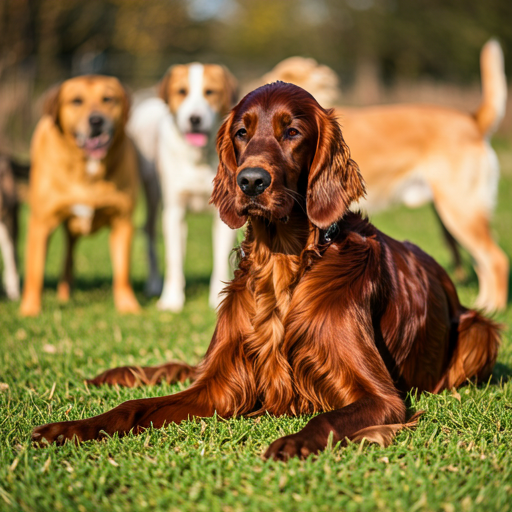
The Role of Exercise in Relationship Building
For Irish Setters, exercise is more than a physical necessity—it’s a vital component of emotional well-being and social harmony. These high-energy dogs benefit greatly from regular and varied physical activities, such as long walks, agility training, courses field dog show, or games of fetch. Shared exercise routines with other dogs help channel their energy productively while fostering camaraderie.
Dogs that are adequately exercised are less prone to restlessness, reducing the likelihood of tension or disruptive behaviors in multi-dog settings. By prioritizing physical activity, owners create a balanced environment for beautiful dogs that promotes positive interactions and overall harmony.
Monitoring and Managing Interactions
Even the most social and well-trained Irish Setters benefit from vigilant supervision during interactions with other dogs. Subtle cues, such as stiff body posture, prolonged eye contact, or low growling, may signal discomfort or brewing tension. Owners should intervene early to redirect attention, using toys, treats, or engaging commands to diffuse potential conflicts.
Consistency in monitoring interactions good family dogs builds trust and reinforces good behavior over time. By setting clear boundaries and fostering a calm environment, Irish Setters and their canine companions can coexist peacefully and enjoy mutually enriching relationships.
Hunting Dogs and Their Instincts
Irish Setters’ lineage as exceptional hunting dogs deeply influences their instincts and social behaviors. Originally bred to work in packs during hunts, they exhibit a natural predisposition for teamwork and collaboration. This heritage often makes them adept at coexisting with other dogs in both work and play settings.
Red setters are known for their intelligence and versatility in training, making them suitable for various canine activities such as obedience and field trials.
Their cooperative spirit, however, is balanced by a pronounced prey drive, which may manifest in heightened interest in smaller animals or pets. Supervision during interactions with smaller dogs or non-canine animals is crucial. With appropriate training and guidance, their hunting instincts can be managed effectively, allowing them to flourish in diverse social environments.
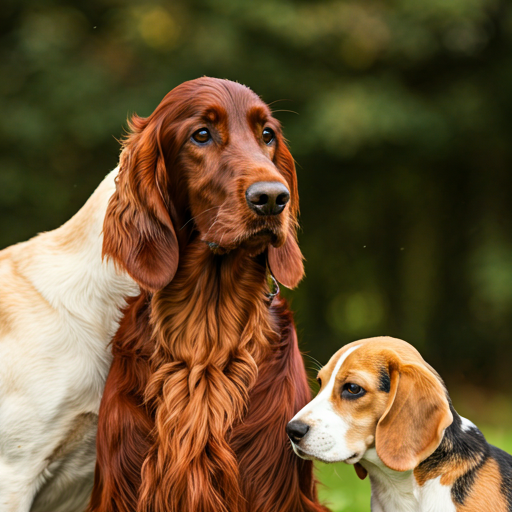
Irish Setters and Family Life
Irish Setters are not just wonderful companions for other dogs; they are also excellent family pets. Their affectionate nature and loyalty make them ideal for families with children. They are generally friendly and patient, often forming strong bonds with family members of all ages. However, due to their high energy levels, they require frequent exercise, making them perfect companions for active families who enjoy outdoor activities and dog sports.
Their love for play and interaction makes them engaging and fun-loving pets, ensuring that they are never just couch potatoes. Nonetheless, potential owners should be aware of health concerns such as progressive retinal atrophy and elbow dysplasia, which can affect the breed. Regular veterinary check-ups and a balanced diet are essential to maintain their health and vitality.
Benefits of Having Multiple Dogs
Having multiple dogs can be a wonderful experience for Irish Setter owners, providing companionship and socialization for their pets. Multiple dogs can also encourage exercise and play, helping to burn off excess energy and prevent destructive behavior. Additionally, having multiple dogs can strengthen the bond between dogs and their human family members, creating a more harmonious and loving household.
Questions
Can Irish Setters be aggressive?
Irish Setters are generally known for their friendly and outgoing nature, making them unlikely candidates for aggression. However, like any dog breed, individual temperaments can vary, and certain situations may trigger aggressive behavior. Factors such as improper socialization, fear, or feeling threatened can lead to defensive actions.
It’s crucial for red setter owners to understand their Irish Setter’s body language and triggers to prevent aggressive incidents. Consistent training and positive reinforcement can help mitigate any aggressive tendencies, ensuring that Irish Setters remain the gentle and sociable dogs they are known to be.
What are the disadvantages of an Irish Setter?
While Irish Setters are wonderful dogs with many positive qualities, potential owners of active breed should be aware of some disadvantages. Their high energy levels require frequent exercise and mental stimulation, which may not suit all lifestyles.
Additionally, their exuberance can sometimes be overwhelming, especially for small children or other pets. Irish Setters are also prone to certain serious health problems and issues, such as progressive retinal atrophy and elbow dysplasia, which require regular veterinary care. Their long, beautiful coats need regular grooming to prevent matting and tangles. Understanding these challenges is essential for anyone considering this breed.
Why are Irish Setters not popular anymore?
Irish Setters were once a highly popular breed for dog ownership, particularly during the 1970s. However, their popularity has waned over the years, possibly due to a shift in lifestyle preferences. Modern families often seek low-maintenance pets, while Irish Setters require significant time and energy investment. Their need for space and exercise may not align with urban living conditions.
The rise of other dog breeds that offer similar companionship with less demand has contributed to their decline in popularity. Despite this, Irish Setters remain cherished by those who appreciate their unique qualities and are willing to meet their needs.
Are Irish Setters prone to separation anxiety?
Yes, Irish Setters can be prone to separation anxiety due to their deep attachment to their human companions. Their loyal and affectionate nature means they thrive on interaction and can become distressed when left alone for extended periods. Signs of separation anxiety in red setter include destructive behavior, excessive barking, and attempts to escape.
In addition to their affectionate personality, grooming practices for the Irish Setter’s coat are essential to maintain their striking appearance.
To help alleviate this, owners can gradually acclimate their Irish Setter to being alone, provide engaging toys, and create a comforting environment. Regular exercise and mental stimulation also play a key role in reducing anxiety levels, ensuring that Irish Setters remain happy and well-adjusted family members.
Irish Setters possess an innate sociability that, when nurtured through proper socialization, dog training alone, and management, makes them excellent companions for both humans and other dogs. Their effervescent energy, cooperative spirit, and deep-seated loyalty enrich every interaction. For owners willing to invest the necessary effort, the rewards are abundant—a lively, harmonious household filled with wagging tails, joyful play, and lasting bonds. These wonderful family pets, with their keen sense of companionship, truly stand out as lovely dogs in the sporting breed category.
Conclusion – Are Irish Setters Good with Other Dogs
In conclusion, Irish Setters are wonderful family pets that thrive on companionship, exercise, and mental stimulation. With proper training, socialization, and introduction to other dogs, they can become a beloved member of any household. Whether you’re an active family or a hunter looking for a loyal companion, the Irish Setter is an excellent choice. Their intelligence, loyalty, and affectionate nature make them a popular breed among dog enthusiasts, and their stunning red coat is sure to turn heads in the dog park.
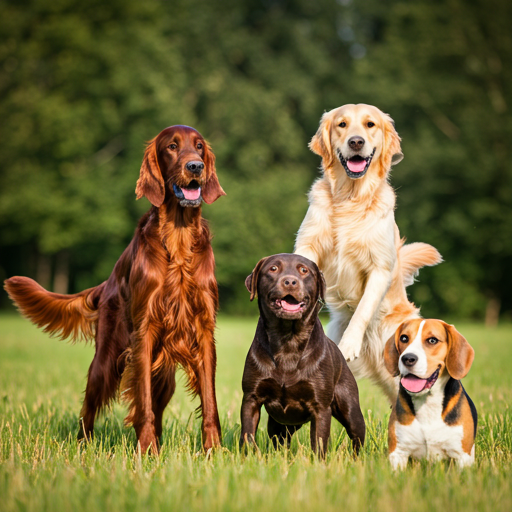











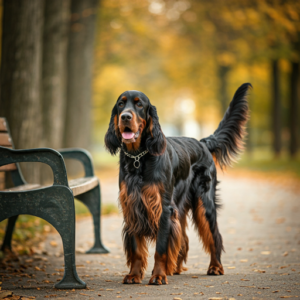
Pingback: How to Socialize an Aggressive Dog with Humans: Key Strategies for Irish Setters - Setterpedia